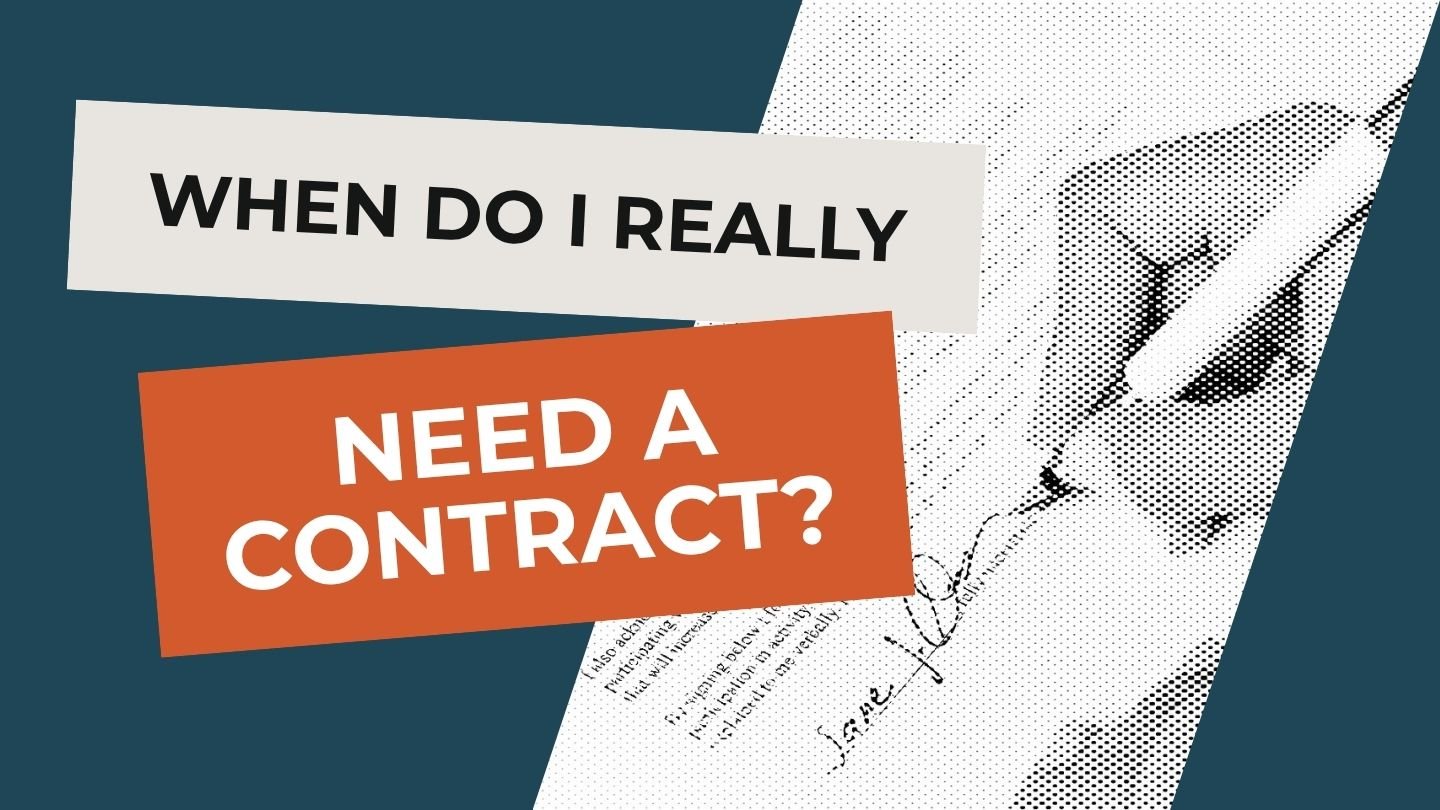When Do I Really Need a Contract?
During our free Initial Consultations, creative professionals frequently ask some variation of this question. The short answer? More often than you think, but not as often as you fear.
Understanding when contracts are essential versus helpful can save you time, money, and countless sleepless nights worrying about projects gone sideways. Let's explore the specific scenarios where creative professionals absolutely need written agreements—and practical tips for implementing them effectively.
When Money Changes Hands
If someone is paying you for creative work, you need a contract. Period.
This applies whether you're shooting headshots for $500 or designing a complete rebrand for $50,000. The dollar amount doesn't determine the need for protection—the exchange of value does.
Consider this: A handshake agreement might work fine when your neighbor asks you to photograph their daughter's graduation party as a favor. But the moment they offer to pay you $200 for the session, you've entered into a business relationship that deserves professional documentation.
Pro Tip: Even for smaller projects, use a simplified agreement that covers basics like deliverables, payment terms, and usage rights. A one-page contract is infinitely better than no contract at all.
Scope Creep Prevention
Ideally, we define a clear, precise scope at the beginning of every project and stick to it. Practically, clients have a tendency to expand their vision once they see initial concepts.
For example, commissioned artworks often evolve through multiple rounds of feedback. What starts as a single portrait becomes a series. A logo design project suddenly includes business cards, letterhead, and social media assets. Without clear boundaries, you're creating significantly more work than originally planned—often for the same fee.
Your contract should specify exactly what you're delivering and include provisions for scope changes. This isn't about being inflexible; it's about ensuring both parties understand when additional work requires additional compensation.
Pro Tip: Include a specific pre-paid contingency amount for scope changes that you return to the client if unused. You have complete control over your ability to give money back; you don't have as much control over the client's delivery of a new check.
Intellectual Property Protection
When you create something original, you automatically own the copyright—but clients don't always understand this distinction. Without a contract specifying usage rights, disputes can arise about how, where, and for how long the client can use your work.
For instance, a client commissioning album artwork might assume they can use your designs for merchandise, tour posters, and future releases. As the creator, you might have different expectations about exclusivity and additional licensing fees.
Clear contracts prevent these misunderstandings by explicitly stating what rights you're granting. Are they getting exclusive use? Can they modify your work? Can they license it to third parties? These details matter significantly for your long-term business interests.
Timeline and Deadline Management
Deadlines in creative projects are notoriously challenging. Clients often want everything "as soon as possible" while taking weeks to provide necessary feedback or materials. Meanwhile, you're juggling multiple projects and trying to maintain quality standards.
Professional contracts include realistic timelines that account for client responsibilities. If the client needs two weeks to review initial concepts, that delay shouldn't compress your final deadline. Similarly, if external factors—illness, family emergencies, or supply chain issues—affect your ability to deliver, your contract should provide reasonable accommodations.
Pro Tip: Build buffer time into your project schedules and include specific consequences for delays on both sides. This protects everyone's interests and sets professional expectations from the start.
Collaboration and Multi-Party Projects
Working with other creatives, agencies, or complex client teams requires extra documentation. When multiple parties are involved, verbal agreements become exponentially more complicated to enforce.
Consider a project involving a photographer, graphic designer, and copywriter. Who owns what intellectual property? How are credits assigned? What happens if one collaborator becomes unavailable? These questions need answers before the work begins, not after disputes arise.
High-Value or Long-Term Projects
The higher the stakes, the more important written agreements become. This includes both high-dollar projects and long-term relationships that will generate ongoing revenue.
For example, licensing artwork for merchandise requires different contract terms than a one-time commission. Ongoing client relationships—like monthly social media content creation—need agreements that address everything from payment schedules to termination procedures.
When Contracts Might Be Overkill
Not every creative exchange requires extensive legal documentation. Teaching a one-hour workshop for friends, contributing artwork to a community charity auction, or trading services with fellow creatives might work fine with informal agreements.
The key is assessing risk versus relationship. If the financial exposure is minimal and you're working with people you trust, streamlined approaches can work effectively.
Building Your Contract Strategy
Remember, contracts increase your zone of control. They allow you to plan for inevitable changes, protect your intellectual property, and maintain professional relationships even when projects encounter unexpected challenges.
Start with templates appropriate for your most common project types, then customize based on specific client needs. Many creative professionals find that having contracts actually improves client relationships by setting clear expectations and demonstrating professionalism.
Most importantly, don't let contract anxiety prevent you from taking on exciting opportunities. A basic agreement that covers essential terms is far better than no agreement at all—and significantly better than learning these lessons through expensive disputes.
The goal isn't to create fortress-like legal documents. It's to establish clear communication and mutual understanding that allows everyone to focus on creating remarkable work.
Ready to protect your work without breaking the bank? Browse our collection of attorney-drafted contract templates covering everything from basic commission agreements and licensing deals to collaboration agreements and work-for-hire contracts. Each template includes clear instructions, customization guidance, and explanations of key terms—giving you professional legal protection for a fraction of the cost of custom legal work. Explore Our Toolkits→

